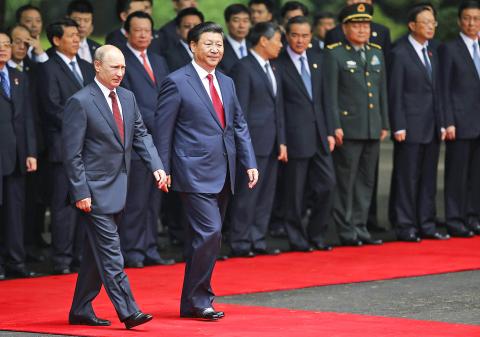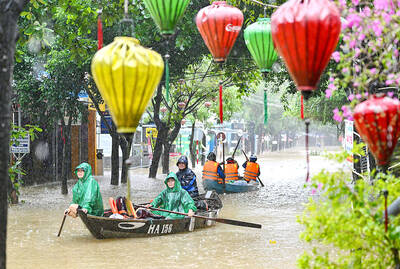Russian President Vladimir Putin met yesterday with Chinese President Xi Jinping (習近平) in a diplomatic boost for the isolated Russian leader, but his spokesman said the two sides had yet to agree on a widely anticipated multibillion-dollar natural-gas sale.
Putin, shunned by the West over Ukraine, met with Xi at the start of a two-day meeting on Asian security with leaders from Iran and Central Asia. The Russian leader is hoping to extend his country’s dealings with Asia and diversify markets for its gas, which now goes mostly to Europe.
Russia and China have been negotiating a proposed 30-year gas supply deal for more than a decade, and officials said they hoped to complete work in time to sign a contract while Putin is in Shanghai. However, Putin spokesman Dmitry Peskov yesterday said it was not finalized.

Photo: Reuters
“Significant progress has been reached on gas, but there are issues that need to be finalized regarding the price,” Peskov said, according to Russian news agencies.
He said a contract could be signed “at any moment.”
A deal would give Moscow an economic and political boost at a time of Western sanctions, while pressure on Moscow is thought to give Beijing leverage to push for a lower price.
US Secretary of the Treasury Jacob Lew appealed to China during a visit last week to avoid taking steps that might offset sanctions.
However, US officials have acknowledged China’s pressing need for more energy.
Putin and Xi attended the signing of 49 cooperation deals in fields including energy, transport and infrastructure, but no details were given at the ceremony.
The price of gas is the sticking point in the proposed agreement between Russia’s government-controlled Gazprom and state-owned China National Petroleum Corp.
A deal has looked increasingly likely after Washington and the EU imposed asset freezes and visa bans on dozens of Russian officials and several companies.
The deal to pipe Siberian gas to China’s northeast would help Russia diversify export routes away from Europe. It would help to ease Chinese gas shortages and heavy reliance on coal.
Putin told Chinese reporters ahead of his visit that China-Russia cooperation had reached an all-time high.
“China is our reliable friend. To expand cooperation with China is undoubtedly Russia’s diplomatic priority,” Putin said, according to Xinhua news agency.
Xi and Putin were scheduled to launch a joint exercise between their two navies in the northern part of the East China Sea.
The two countries developed a strategic partnership after the 1991 Soviet collapse, including close political, economic and military ties in a shared aspiration to counter US influence, especially in Central Asia.
A tentative agreement signed in March last year calls for Gazprom to deliver 38 billion cubic meters of gas per year beginning in 2018, with an option to increase that to 60 billion cubic meters.
Plans call for building a pipeline to link China’s northeast to a line that carries gas from western Siberia to the Pacific port of Vladivostok.
A gas deal would mean China would be in a “de facto alliance with Russia,” said Vasily Kashin, a China expert at the Center for Analysis of Strategies and Technologies in Moscow.
In exchange, Moscow might lift restrictions on Chinese investment in Russia and on exports of military technology, Kashin said.
“In the more distant future, full military alliance cannot be excluded,” Kashin said.
“It will, however, take years for China to start playing in the Russian economy a role comparable to that of the EU,” he said. “After that happens, both China and Russia will be much less vulnerable to any potential Western pressure and that, of course, will affect the foreign policy of both these countries.”

With much pomp and circumstance, Cairo is today to inaugurate the long-awaited Grand Egyptian Museum (GEM), widely presented as the crowning jewel on authorities’ efforts to overhaul the country’s vital tourism industry. With a panoramic view of the Giza pyramids plateau, the museum houses thousands of artifacts spanning more than 5,000 years of Egyptian antiquity at a whopping cost of more than US$1 billion. More than two decades in the making, the ultra-modern museum anticipates 5 million visitors annually, with never-before-seen relics on display. In the run-up to the grand opening, Egyptian media and official statements have hailed the “historic moment,” describing the

‘CHILD PORNOGRAPHY’: The doll on Shein’s Web site measure about 80cm in height, and it was holding a teddy bear in a photo published by a daily newspaper France’s anti-fraud unit on Saturday said it had reported Asian e-commerce giant Shein (希音) for selling what it described as “sex dolls with a childlike appearance.” The French Directorate General for Competition, Consumer Affairs and Fraud Control (DGCCRF) said in a statement that the “description and categorization” of the items on Shein’s Web site “make it difficult to doubt the child pornography nature of the content.” Shortly after the statement, Shein announced that the dolls in question had been withdrawn from its platform and that it had launched an internal inquiry. On its Web site, Le Parisien daily published a

UNCERTAIN TOLLS: Images on social media showed small protests that escalated, with reports of police shooting live rounds as polling stations were targeted Tanzania yesterday was on lockdown with a communications blackout, a day after elections turned into violent chaos with unconfirmed reports of many dead. Tanzanian President Samia Suluhu Hassan had sought to solidify her position and silence criticism within her party in the virtually uncontested polls, with the main challengers either jailed or disqualified. In the run-up, rights groups condemned a “wave of terror” in the east African nation, which has seen a string of high-profile abductions that ramped up in the final days. A heavy security presence on Wednesday failed to deter hundreds protesting in economic hub Dar es Salaam and elsewhere, some

Flooding in Vietnam has killed at least 10 people this week as the water level of a major river near tourist landmarks reached a 60-year high, authorities said yesterday. Vietnam’s coastal provinces, home to UNESCO world heritage site Hoi An ancient town, have been pummeled by heavy rain since the weekend, with a record of up to 1.7m falling over 24 hours. At least 10 people have been killed, while eight others are missing, the Vietnamese Ministry of Natural Resources and Environment said. More than 128,000 houses in five central provinces have been inundated, with water 3m deep in some areas. People waded through